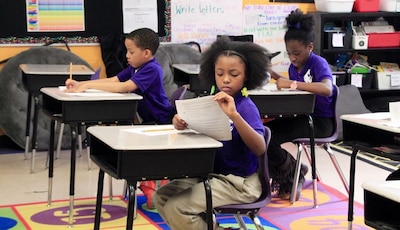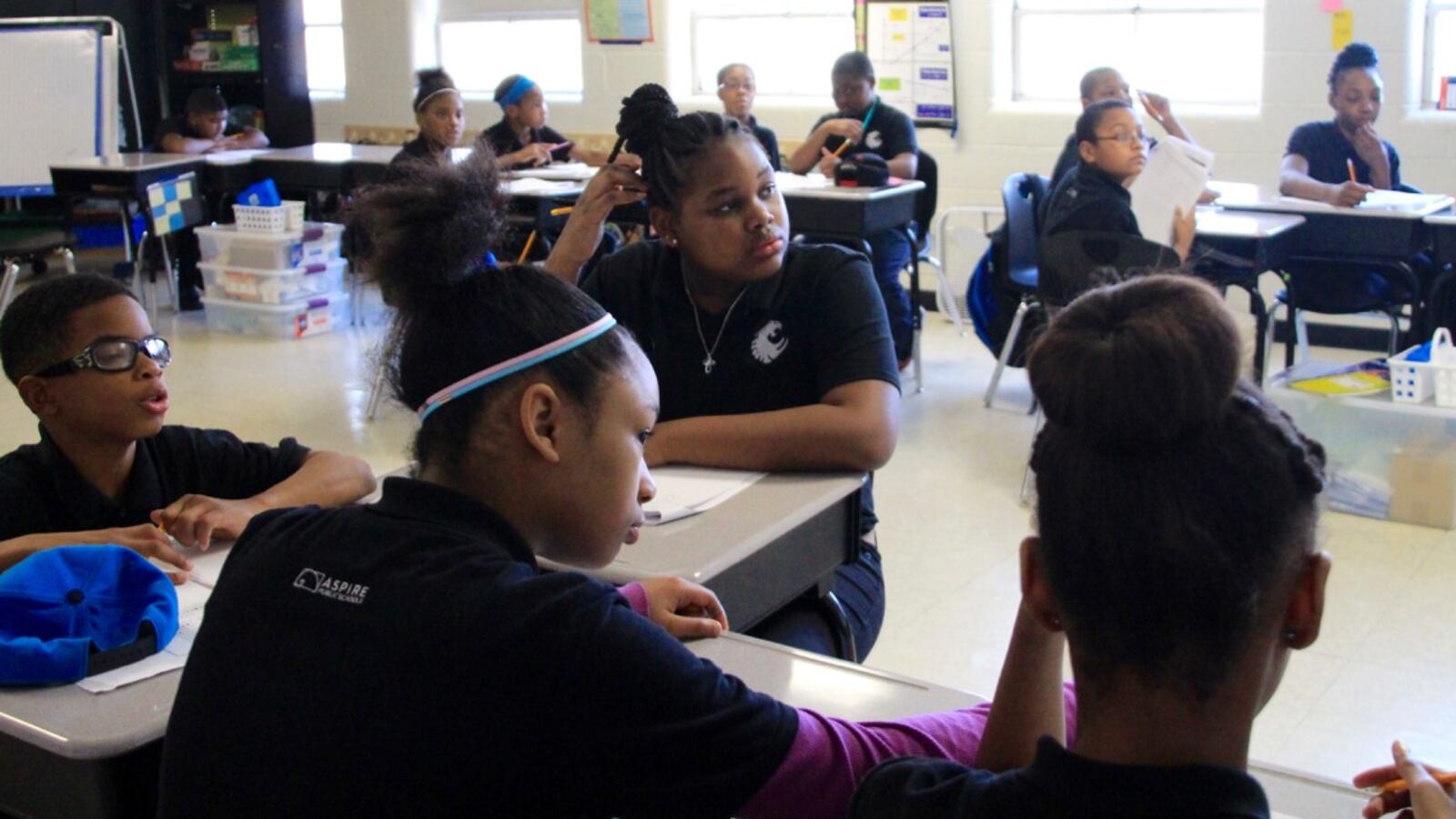When a 12-year-old girl entered her fifth elementary school in five years, she arrived with a lengthy suspension record — and a past filled with sexual violence and neglect.
Chronic conflict at home had made it hard for her to listen in class and avoid fights with peers. But at Aspire Coleman, a state-run charter school in Memphis, she felt heard by her teachers for the first time. The seventh-grader is poised to finish her first full school year suspension-free.
“I used to get into more drama and fights at school,” said the girl, whose name is withheld to protect her identity. “I was just really angry, and then I’d get embarrassed when teachers yelled at me. But here, I don’t get yelled at like that. We just talk.”
Leaders at Aspire Coleman, whose 525 students are mostly black and poor, have been revamping their disciplinary practices based on gender, with a special focus on girls of color who have experienced trauma. They now offer separate advisory classes to support girls and boys, and have trained staff on how to work with students who have been abused or neglected.
After three years, suspensions are down by two-thirds school-wide, and are well below the national rate for girls of color.
“Education can never be a one-size-fits-all approach,” said Principal Owen Ricciardi, “so why would we treat discipline any different?”
Researchers increasingly point to emotional trauma as the root of disciplinary problems that lead black girls, as a group, to be suspended or expelled six times more frequently than girls of any other race — more often than white boys, too. Trauma can range from abuse and neglect to homelessness and family dysfunction.
The data has school leaders across the nation rethinking their disciplinary policies. Last fall, the White House co-hosted a conference on the issue that drew representatives of at least 22 school systems from 15 states, including Tennessee’s Achievement School District, which oversees Aspire Coleman. The collective goal was to learn how to build more supportive climates that help black girls overcome childhood trauma and focus on academics, leading to fewer disciplinary infractions.
“The trauma a student experiences is often silent or invisible when that student is at school,” explains Rebecca Epstein, executive director of the Georgetown Center on Poverty and Inequality, which helped to spearhead the conference. “It’s harder for teachers to recognize and it requires training if you want to shift a school climate. Everyone in a school, from the bus driver to the principal, needs to be educated on signs of trauma, on the background of childhood trauma, and the trauma that can be unique to girls of color.”
Black girls comprise only 8 percent of the nation’s students, but represent 14 percent of those who receive one or more out-of-school suspensions, according to the U.S. Department of Education’s Civil Rights Data Collection.
And researchers say time missed from school due to suspensions increases the odds of more disciplinary issues, dropping out of school, unwanted pregnancies, or being caught in the juvenile justice system.
The challenges hit home in Tennessee’s Achievement School District, which takes over the state’s lowest-performing schools and assigns them to charter operators like Aspire. Among the ASD’s 33 schools, most of which are in Memphis, more than 15 percent of female students have been suspended during the last three years. The vast majority of those girls are black.

At Aspire Coleman, almost 97 percent of the student body is black, and 48 percent are girls of color. During its first year as a charter school beginning in 2014, administrators suspended 15 percent of the school’s students, equating to a lot of missed instruction time. Ricciardi vowed to reduce that rate to zero and started out by developing gender-based approaches to discipline. Teachers were trained about the challenges that black girls face in poor neighborhoods, often causing them to act out. Next they learned about restorative justice approaches that build a positive school climate by emphasizing conversation, empathy and reconciliation.
“We’re trying to get educators to buy into the ‘why’ behind how kids act,” said Queria Nunnley, the assistant principal who has shepherded the new approach. “We don’t want them to see a student as acting bad. We want them to ask, ‘Why is this student acting out? What supports do they need?’”
While research on the academic effects of separating students by gender is mixed, educators at Aspire Coleman say gender-based disciplinary tactics have helped in one crucial way.
“We’ve found that girls are much more likely to open up about what’s going on if they are broken off into a group of their own gender,” said Breonna Ponder, who helps provide gender-based programs through Communities in Schools. “We can get deep with struggles that girls in this school disproportionately deal with — like how to be appropriate on social media, how to say no when a boy pressures them, or how to resolve conflict when they have two friends fighting.”
Chantavia Burton, chief of student equity and access for the state-run district, hopes the school’s lessons can be extrapolated to the ASD’s other schools.
“We’ve seen on a national scale the focus on school-to-prison pipelines, and that’s led to a focus on disparities in discipline practices for men of color,” Burton said. “We’re glad those conversations are happening, but we recognize there hasn’t been as big of a focus on the women in our schools. We want to change that. … Women in these communities bear burdens silently. It’s not talked about openly; girls internalize. We in education have to recognize that and realize that just suspending girls who are angry or acting out might not help them on the road to rehabilitation.”
Schools can start, Epstein said, simply by asking students what they are struggling with and what they need. Sometimes the difference is as simple as knowing that girls who have been abused by men would do better in a female teacher’s classroom.
Such was the case for the 12-year-old student who arrived at Aspire Coleman with a history of sexual abuse. Administrators asked her if she’d prefer a male or female teacher.
“It can be difficult for me with male teachers,” the girl acknowledged. “I feel like those personal things about me, the things that have made school hard for me, those get paid attention to here.”

